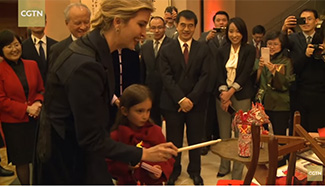MOGADISHU, Feb. 3 (Xinhua) -- Somali leaders have welcomed the ruling by International Court of Justice (ICJ) concerning a dispute with Kenya on the maritime delimitation within the Indian Ocean.
Somali President Hassan Sheikh Mohamud and Prime Minister Omar Abdirashid Ali Sharmarke said in separate statements issued on Thursday night that the Court's verdict was fair and just as it would protect the country's sovereignty and its natural resources.
"The government and the Somali people welcome the Court's fair and just decision and are proud to protect the sovereignty and sovereign rights of Somalia's maritime zones and the natural resources it holds," Mohamud said in the statement.
He said the government strongly believes in the strength of its legal case and looks forward to a fair and just final decision from the Court on the merits of its case.
He said the Somali and the Kenyan people share strong cultural and historical ties that cannot be severed or affected by any disagreements among them.
"Somali and the Kenyan people's destiny and future are indissolubly interconnected. Hence, the government is committed to continuing to work hard in close cooperation with its brothers and sisters in Kenya to address the pressing issues confronting both nations and the region," he added.
The ICJ, the principal judicial organ of the United Nations, on Thursday issued a verdict, admitting an application submitted by Somalia, over the maritime delimitation between it and Kenya in the Indian Ocean.
In its final judgment and without appeal, the Court rejected objections raised by Kenya which referred to a Memorandum of Understanding and the UN Convention on the Law of the Sea, and found that it has jurisdiction to entertain Somalia's application and that the application is admissible.
The Court ruled that the MOU did not constitute an agreement "to have recourse to some other method or methods of settlement" within the meaning of Kenya's reservation and consequently the case did not, by virtue of the memorandum of understanding, fall outside the scope of Kenya's consent to the Court's jurisdiction.
It further concluded that neither the Memorandum of Understanding nor the relevant part of the UN Convention on the Law of the Sea fell within the scope of the reservation to Kenya's optional clause declaration and rejected Kenya's preliminary objection to the jurisdiction of the Court, also having previously found that the Memorandum of Understanding did not contain an agreement as stated by Kenya, the Court rejected that aspect of Kenya's second preliminary objection.
In his statement, Sharmarke said they were confident from the onset that Somalia would win this case.
"Today (Thursday) we celebrate the work of several transitional governments and the current government's efforts to defend our maritime boundary. This is a collective effort from all involved and a national sovereignty case," Sharmarke said.
He commended the excellent legal debates of Somalia lawyers on this important case and reminded all Somalis, particularly politicians, that they should sustain the unity of purpose.
"This court case is a dispute between two nations not between Somalis. The focus should be to win this case and defend our territorial waters. It should not be politicized for short-term political gains. I want to underscore how important that is for us at this historic moment for our nation," the PM said.
In August 2014, Somalia had approached the Court, requesting it to determine, on the basis of international law, the complete course of the single maritime boundary dividing all the maritime areas appertaining to Somalia and to Kenya in the Indian Ocean, including the continental shelf beyond 200 nautical miles (370.4 kilometres).
As basis for the Court's jurisdiction, Somalia invoked the declarations recognizing the Court's jurisdiction as compulsory made by the two States.














